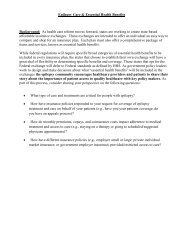Legal Rights of Children with Epilepsy in School & Child Care
Legal Rights of Children with Epilepsy in School & Child Care
Legal Rights of Children with Epilepsy in School & Child Care
You also want an ePaper? Increase the reach of your titles
YUMPU automatically turns print PDFs into web optimized ePapers that Google loves.
<strong>Legal</strong> <strong>Rights</strong> <strong>of</strong> <strong><strong>Child</strong>ren</strong> <strong>with</strong> <strong>Epilepsy</strong> <strong>in</strong> <strong>School</strong> and <strong>Child</strong> <strong>Care</strong><br />
5.3Q:<br />
Are students <strong>with</strong> epilepsy who are protected by Section 504 automatically<br />
entitled to special education?<br />
A: No. To receive special education under Section 504, a student <strong>with</strong> epilepsy<br />
would need special education as a reasonable accommodation for his or her<br />
disability. Special education would be the means by which the student would<br />
ga<strong>in</strong> an equal opportunity to participate <strong>in</strong> education along <strong>with</strong> peers <strong>with</strong>out<br />
disabilities. Many students <strong>with</strong> epilepsy do not need special education services;<br />
rather, they may need accommodations such as extra time for tests or additional<br />
time to make up work missed because <strong>of</strong> seizures or medical appo<strong>in</strong>tments. If<br />
students <strong>with</strong> epilepsy have other disabilities, such as learn<strong>in</strong>g disabilities or<br />
attention deficit hyperactivity disorder, <strong>in</strong> addition to their epilepsy, they may<br />
need special education to address those disabilities or the needs that arise from<br />
the comb<strong>in</strong>ation <strong>of</strong> disabilities.<br />
5.4Q:<br />
If a student takes medication that completely controls his or her seizures,<br />
does that preclude his or her eligibility for services under Section 504?<br />
A: It depends. A student may take medication that completely controls his or<br />
epilepsy, but the medication may cause side effects that require the provision <strong>of</strong><br />
accommodations to the student. For <strong>in</strong>stance, he or she may need extra time to<br />
complete work because <strong>of</strong> frequent naps due to sleep<strong>in</strong>ess from the medication.<br />
In such a case, the student may be covered under Section 504. Or, the student<br />
may need medication adm<strong>in</strong>istered dur<strong>in</strong>g the course <strong>of</strong> the school day, and<br />
school staff will be responsible for adm<strong>in</strong>ister<strong>in</strong>g it as an accommodation under<br />
Section 504. See Question 5.5. However, if the student is not impaired <strong>in</strong> any<br />
way by his or her epilepsy or by the medication he or she takes to control the<br />
epilepsy, the epilepsy would not be considered to substantially impair a major<br />
life activity, and the student may not be protected by Section 504. 41 However, if<br />
the student’s situation were to change, the student might become eligible for<br />
services under Section 504. For <strong>in</strong>stance, if the student began to experience<br />
breakthrough seizures that <strong>in</strong>terfered <strong>with</strong> his or her ability to complete school<br />
assignments, or if she began a new medication that caused <strong>in</strong>terfer<strong>in</strong>g side<br />
effects, or someth<strong>in</strong>g else were to occur that substantially limited at least one <strong>of</strong><br />
his or her major life activities such as learn<strong>in</strong>g, the student would come under<br />
the scope <strong>of</strong> Section 504.<br />
41 However, schools generally do not dispute that a student has a disability <strong>with</strong><strong>in</strong> the mean<strong>in</strong>g <strong>of</strong> Section<br />
504, and only a few cases have ruled that a student is not covered because <strong>of</strong> mitigat<strong>in</strong>g measures used to<br />
control his or her disability.<br />
72








